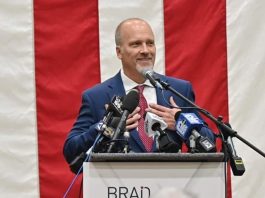The estimated full cost of the Hartland Arrowhead school referendum project could rise to more than $405 million, an amount that includes interest, according to an assessment estimate provided to the district by R.W. Baird and obtained by Wisconsin Right Now.
The School District has repeatedly told the public that the project will cost $261 Million. On the Tuesday ballot, voters will be asked whether to approve the referendum.
When asked about the discrepancy, Superintendent Conrad D. Farner told Wisconsin Right Now that it’s common for school districts not to include interest in the cost estimates they give voters, which helps account for the difference. However, he said that the higher estimate was included in the levy impact.
We would note that the federal Truth in Lending Act for home and auto loans “requires lenders to provide standardized information about the costs and terms of loans, including the annual percentage rate (APR), the loan term, and the cost of the loan. This information helps consumers compare loans and credit costs.” Although we are not arguing that Act applies to Hartland’s school referendum, the contrast does beg the question of whether all Wisconsin school districts should transparently tell voters the full estimated cost of school referendums.
“We are following the same process we have always used, which, to the best of my knowledge, is the same process ALL districts have used for the decades that communities have been asked to approve referenda,” Farner said. “The cost of the new school is the $261.2 million we are communicating. The amount of interest on the loan is a completely separate, and much more complicated issue.” You can read Farner’s full email at the end of this story.
However, the higher amount was used to calculate the levy increase, he acknowledged, but the ballot will ask voters for $261.2 million.
Jeff Gross, Director of Business Services, sent a constituent the Baird document in an email, Wisconsin Right Now confirmed. He did not respond to a request for comment.
The Baird document is titled “Arrowhead Union High School District: Illustration of November 2024 Facilities Referendum Financing Plan.” It breaks down the general obligation bonds into principal, interest, and hypothetical cash defeasance. It also includes categories for “total fund 39 debt levy” and “hypothetical state aid impact from debt service expenditures.”
The “combined cost (factoring aid)” is $405,140,881.
Read it here:
November 2024 Referenda – Arrowhead UHSD
The referendum question “proposes building a new $261.2 million high school to replace the current two aging buildings (North and South campuses). The new school will offer improved safety, increased efficiency, and modern learning spaces. The estimated tax impact is $191 per $100,000 of property value,” the district’s website says.
(There is also a second referendum question on the ballot. “This referendum question seeks $1.9 million annually for the next four years to cover rising operational costs like utilities, insurance, and special education. The tax impact is $2 per $100,000 of property value per year,” it says.)
Hartford Union High School Referendum
The Hartford Union High School District also has a referendum on the ballot, although much smaller than Arrowhead as they are not asking for a complete teardown and rebuild of the school, but instead are asking to replace roof sections, upgrade HVAC system, update tech education, make restrooms ADA compliant, and repair the track and pool.
HUHS is asking for $25.8 million for these items. According to the Baird assessment for that district, an additional $16.7 million in interest expense, will occur over 20 years. This assessment was made publicly available on the HUHS referendum page.
 Here is the Arrowhead Superintendent’s full response:
Here is the Arrowhead Superintendent’s full response:
We are following the same process we have always used, which, to the best of my knowledge, is the same process ALL districts have used for the decades that communities have been asked to approve referenda. The cost of the new school is the $261.2 million we are communicating. The amount of interest on the loan is a completely separate, and much more complicated issue.
The school we are asking the citizens to approve will cost $261.2 million…that is a solid, accurate number. The estimated cost to pay the interest on the loan is only an estimate but it is included in the tax levy impact we are communicating to our taxpayers. Over 35 years of experience as an educator in southeast Wisconsin, I have never seen the cost of a capital project communicated any other way. ALL districts communicate the cost to build a school and use the cost of the school in the resolutions the School Boards approve. The attorneys who advise districts use the construction costs of the project in the official resolutions that School Boards approve. The official referendum questions on the ballot use the construction costs to build the school/facility. If you know of a district that included the interest on the borrow as part of the official resolution, and/or the actual ballot question, please let me know. I have only seen districts ask their citizens to approve borrowing the funds to cover the construction costs of the project.
The number that matters when it comes to taxpayers knowing the impact of a project on their taxes is the TAX LEVY IMPACT PROJECTION. District administrators consult with financial experts, such as Baird, who help calculate the costs associated with borrowing millions of dollars. The estimated cost of the interest is ALWAYS included in the tax levy impact that is provided to taxpayers.
As I have never heard this question raised over the previous 8 referenda with which I have been associated, I can only provide my best assumptions as to why districts do not include the cost of the interest when providing information on the cost to build a new school. One reasonable explanation is the interest is only an estimate…it is never a hard and fast number as numerous factors influence what the actual amount ends up being. Districts estimate on the high end when calculating and providing the tax levy impact so as to NOT create the scenario where the actual impact is greater than advertised. It often turns out that the annual tax increases are lower than communicated, as increasing overall property values in the area, as well as defeasance, earned interest and interest rates all impact the actual tax impact from year to year. Every business manager with whom I have worked has paid off loans early to save on interest, so that is another factor that cannot be predicted or guaranteed as far as the actual impact. Because no one wants to put out a number that they know is not locked in, it does not make sense to put much emphasis on the estimated costs of the borrow. The cost of the construction is a known, set number that cannot be exceeded, so it just makes sense that is the number that is communicated about the cost of a project.
Another reason I would think many view focusing on the interest as not necessary is that anyone who has ever bought a house or a car, or had a basic finance or accounting class, should understand that when you borrow money, there is interest on the loan. The more you borrow, the more interest that is involved. The total amount of interest is not what anyone focuses on when borrowing money for a house or car…they focus on the monthly payments as that tells them what they need to budget…and/or whether they can afford that house or car.
That is exactly what districts do when they provide the tax levy impact associated with any borrowing of funds. The tax levy impact we have provided to our community ($2 per $100,000 for the operational referendum and $191 per $100,000 for the new school) INCLUDES THE ESTIMATED INTEREST ON THE BORROW. Taxpayers are then able to use those numbers to determine the impact on their taxes which helps them decide whether they ultimately support the referendum question or not. That is the consistent, transparent process districts have been using for decades.
Another reason districts would not communicate the interest costs to borrow millions of dollars for a building project is it would no doubt add confusion. I can just about guarantee that if districts added the cost of interest to the actual project costs, people would assume/conclude that the construction costs are that total (higher) number and then they would ask for the interest on the loan for that much larger number. People would be asking why there are two numbers and does the project cost $250 million or $300 million…which is it??? If the numbers communicated to citizens leading up to the election day do not match what is actually on the ballot, that would create incredible confusion. Most would agree that anything that causes confusion is not likely to help a referendum.
Another reasonable explanation for why districts use the tax levy impact when communicating the tax impact of a project is that is the number that matters. If a district did decide to emphasize the cost of the borrow and include that in communication efforts, the estimated tax levy impact would BE THE SAME NUMBER as if they just used the cost of construction. No matter what numbers are included in any communication, the tax levy impact is the number taxpayers use to figure out the impact on their taxes. If you provide the estimated cost of the borrow, that number does not enable anyone to calculate the tax impact…it is just a larger number than the construction costs of the project.
Finally, and there could be more reasons but this has gone on long enough, it is common knowledge that when people talk about the value or cost of their home, they do not say, “My house cost $500,000 plus the interest on the mortgage.” Nor do people say, “I am asking $500,000 for my house plus the interest the buyer has to pay.” Nor do people negotiate the sale price of a home by including references to the associated interest for the mortgage. Nor are taxes calculated based on the mortgage interest…the cost of a home/building is what everyone uses when talking about/comparing the value of the home/building.
I have copied our Director of Business Services, Jeff Gross, as he is the individual who worked directly with Baird on our numbers. He is best positioned to answer specific questions about the estimated interest on any loan. Everything we have shared is as accurate as can be. We are following the same calculations, methods, processes and communications that all districts use. We respond to all questions with accurate information. My guess is individuals who are focusing on the interest costs, and ignoring the fact that those costs are in the tax levy impact, are actually trying to sow confusion as they are likely against the referendum being passed.
Table of Contents







![WATCH: Elon Musk Town Hall Rally in Green Bay [FULL Video]](https://www.wisconsinrightnow.com/wp-content/uploads/2022/04/Elon_Musk_3018710552-265x198.jpg)



![The Great American Company [Up Against the Wall]](https://www.wisconsinrightnow.com/wp-content/uploads/2025/03/MixCollage-29-Mar-2025-09-08-PM-4504-265x198.jpg)
![The Wisconsin DOJ’s ‘Unlawful’ Lawman [WRN Voices] josh kaul](https://www.wisconsinrightnow.com/wp-content/uploads/2025/03/MixCollage-29-Mar-2025-08-48-PM-2468-265x198.jpg)